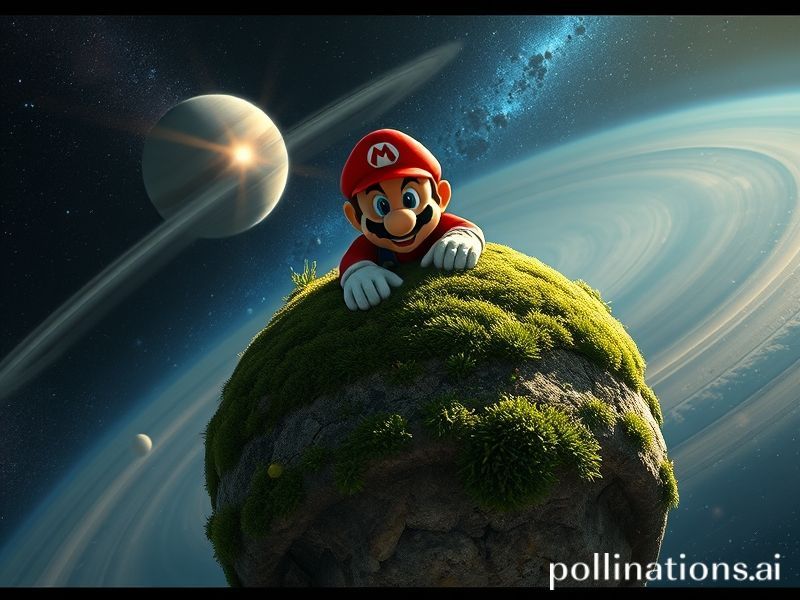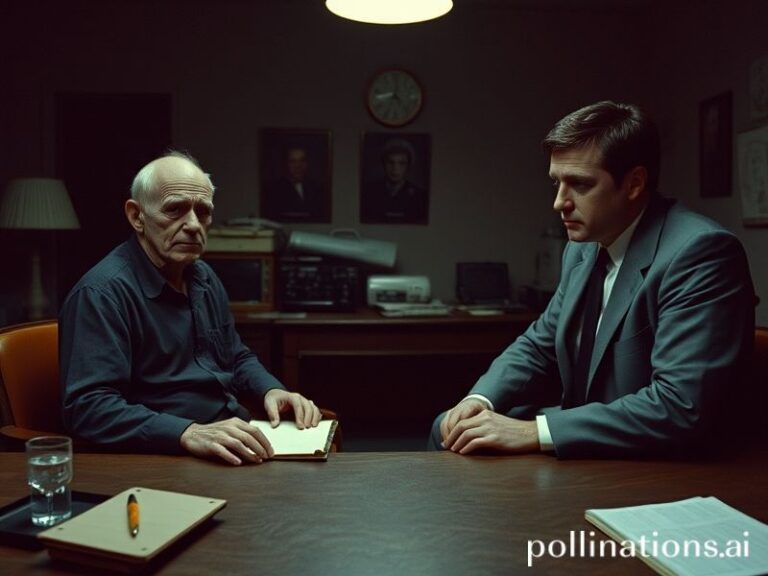Galactic Distraction: How the Super Mario Galaxy Movie Became a Global Opiate While Earth Burned
The Super Mario Galaxy Movie: A Cosmic Distraction From a Planet in Free-Fall
By Dave’s Foreign Correspondent, still dazed from economy-class turbulence and the existential variety
Hollywood—If you squint past the mushroom-shaped confetti drifting over the Dolby Theatre, you can almost pretend the screaming outside is just another marketing stunt. Universal’s “The Super Mario Galaxy Movie” premiered last night beneath a rigged-up planetarium dome, because nothing says “escapism” like projecting cartoon galaxies onto a smog-choked Los Angeles sky. Delegations from Tokyo, Milan, Lagos, and São Paulo jostled for selfies with a fiberglass Luma while, three blocks away, the National Guard practiced crowd-control formations on a city that hasn’t slept through the night since 2020.
International critics are calling the film “a gravity-bending triumph,” which is convenient, because gravity is precisely what the real world seems to be losing. The plot—plumber catapults across celestial kingdoms to rescue a princess from a turtle with astrophysics issues—mirrors our geopolitical moment if you replace “princess” with “global supply chain” and “turtle” with “whoever controls the shipping lanes this week.”
From Nairobi to Naples, multiplexes booked extra showings to capitalize on the weak local currencies: why riot over bread prices when you can watch Bowser hurl baguette-shaped meteors at a talking star for the cost of two actual baguettes? In Seoul, ticket holders received commemorative “Star Bits” candy; the sugar high lasts longer than the won’s rally ever did. Meanwhile, French intellectuals—never ones to miss a chance for self-immolation—debated whether Rosalina’s storybook narration constitutes neo-colonial infantilization or post-structural feminist allegory. (Consensus: both, plus marketing synergy.)
The real action, however, is off-screen. Nintendo’s cross-border merchandising blitz—limited-edition Switch consoles, a Louis Vuitton star cruiser handbag, and, for reasons unclear, a Vatican-licensed Rosary shaped like a Power Star—has turned the film into a soft-power Trojan horse. The Japanese government quietly slipped ¥2 billion into the production budget via a “cultural innovation grant,” presumably because nothing projects pacifist intent like exporting Italian stereotypes voiced by Chris Pratt.
China allowed the movie in, but only after censors trimmed three seconds of Luigi’s “ghost vacuum” scene for promoting occult consumerism. In response, the Italian embassy in Beijing issued a 47-tweet thread explaining that Luigi is, in fact, a plumber, not a spiritual medium—diplomacy in the TikTok era. Russia, still busy redrawing globes the old-fashioned way, opted to pirate the film instead, ensuring every babushka from Murmansk to Vladivostok can now hum Gusty Garden Galaxy while queueing for sugar.
Economists at the IMF—not traditionally fans of sentient planets—note that global merchandise pre-sales alone ($1.4 billion and counting) now exceed the GDP of 27 actual countries. One senior economist, speaking on condition of anonymity and two martinis, admitted, “If we could tax nostalgia at the same rate as carbon, we’d fund the energy transition by Thursday.” Instead, we get NFT star maps and Elon Musk tweeting that he’s building a real Comet Observatory above Texas, presumably with the same workforce he’s currently laying off.
The film’s climax—Mario flings himself into a supermassive black hole, trusting that love is a stronger force than physics—drew a standing ovation in every continent except Antarctica, where scientists were too busy watching their ice shelves calve in real time. Critics lauded the “emotional realism.” Audiences left theaters humming, then checked their phones to discover the oceans had risen another millimeter.
And yet, perhaps that’s the point. In an era when terrestrial leadership offers chiefly event-horizon vibes, retreating to a galaxy where problems are solved by triple-jumps and star-powered hugs feels almost rational. The movie ends with Mario and Peach rebuilding the cosmos one luminary at a time; humanity exits the cinema to rebuild its own cosmos one doom-scroll at a time.
The credits roll, the dome retracts, Los Angeles coughs itself awake. Somewhere, a child clutches a plastic Luma and asks if stars can really talk. An adult—degree in international relations, two mortgages, chronic heartburn—kneels and lies convincingly. For 92 minutes plus trailers, the universe has a soundtrack, a moral, and a reset button. We file back into the smog, slightly lighter, slightly poorer, secretly hoping the next black hole is as forgiving as Nintendo’s.
Back in the theatre, the lights dim again for the midnight screening. The world may be ending, but the concession stand is doing gangbusters. That, dear reader, is what passes for multilateral cooperation these days.







